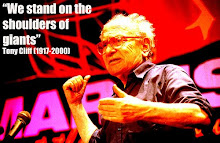Monday, 24 August 2009
Midnight of the century
Posted item #15 'The Moscow Trials'
The 1930s were turbulent times and witnessed the historic defeat of the working class in two hugely important ways: the rise of fascism and the entrenchment of Stalinism in the Soviet Union. The triumph of Hitler's Nazis in 1933 represented a crushing defeat for the powerful German working class, while the consolidation of Stalin's power crushed the hopes of 1917 and nearly extinguished the authentic marxist tradition.
Trotsky, more than anyone, carried the torch of genuine revolutionary socialism forwards. He did this in extraordinarily harsh and brutal conditions, for himself personally and for his supporters.
Many of Trotsky's 1930s writing exemplify the best in the marxist tradition - for example his analysis of the events in Germany - and he strove to continue revolutionary organisation, despite awful repression in the Soviet Union (from where he was exiled in 1929) and being so marginalised everywhere.
The Moscow Trials of 1935-37 symbolise how far Stalin's counter-revolution had gone, how utterly removed from the revolutionary aspirations of the post-1917 period his regime had become. Many of the Bolsheviks' Central Committee from 1917 were killed, following grotesque and absurd show trials in which the accused were forced to confess to crimes they had never committed. They were tarred with the terrible accusation of being in league with Trotsky, who was in turn supposedly a fascist agent (ludicrous on several levels, not least because he was Jewish).
One of the strengths of Cliff's account of the trials is his explanation of their material basis. They weren't simply the excesses of a crazed dictator, but had important political motives and served the Stalinist bureaucracy's need, as the head of a state capitalist society, for the eradication of any threats to its own economic and political power. Cliff also looks at the degradation of the revolution and the rising power of the bureacracy to account for how once-heroic revolutionaries could abase themselves so pitifully before Stalinist power.
Cliff's account of the Moscow trials, which I'm posting here, is a chapter from the fourth and final volume of his epic Trotsky biography. This volume covers the years from Trotsky's expulsion from the Communist party in 1927 until his assassination by a Stalinist agent in Mexico in 1940.
This volume can seem bleak - these years were truly the midnight of the century, his personal suffering was immense, Trotskyism became a tiny and marginal political force - but Cliff offers a wealth of historical insight and teases out the important theoretical insights found in Trotsky's immense corpus of writing from this time.
Subscribe to:
Post Comments (Atom)

This comment has been removed by a blog administrator.
ReplyDelete